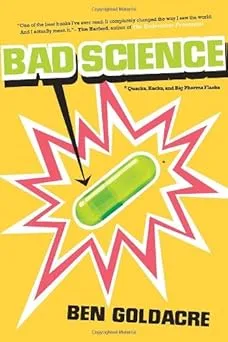About this book
Five Key Takeaways
- Detox claims often misrepresent biological processes and science.
- Cosmetics rely on marketing, not backed by real science.
- Placebo effect highlights the power of belief in healing.
- Cognitive biases can mislead our understanding of evidence.
- Journalists must ensure health reporting is scientifically accurate.
-
Detox Products Lack Scientific Basis
Detox products claim to expel bodily toxins, but experiments prove these processes lack scientific grounding. Water color changes in detox treatments result from chemistry, not toxins (Chapter 1).
The term "detox" falsely suggests an additional bodily system that removes toxins. In reality, the liver and kidneys efficiently handle waste elimination.
These pseudoscientific claims often exploit cultural beliefs in health rituals, creating confusion about genuine treatments versus trendy fads.
Vague and undefined concepts of "toxins" instill unnecessary fear, misleading consumers into thinking everyday exposure requires such treatments.
Testimonials may feel convincing, but personal anecdotes don't equate to rigorous evidence of efficacy. Many are swayed by placebo effects rather than real health outcomes.
The misrepresentation of biology through detox marketing reduces public trust in credible medical science.
This could encourage people to prioritize unverified solutions over proven lifestyle changes, potentially compromising health in the long term.
Understanding and avoiding these poorly substantiated claims equips people to choose evidence-based health practices.
-
Cosmetics Rely Heavily on Pseudoscience
The cosmetics industry markets products using unverifiable "miracle ingredients" that mislead consumers about their efficacy.
Although scientific terms are featured on labels, the actual benefits of many products are marginal or nonexistent.
This creates an illusion of sophistication and undermines simple, effective skincare solutions, like proper hydration or basic moisturizers.
High-profile brands often dilute powerful chemicals to ineffective levels, creating compliance with regulations while reducing product impact.
According to the author, these practices perpetuate consumer beliefs that expensive options are inherently superior.
Most beauty claims aren't backed by robust evidence, relying on weak studies or anecdotal data to validate effectiveness.
Consumers end up paying for perception rather than performance, which redirects resources from meaningful self-care practices.
Understanding legitimate, evidence-backed treatments can help navigate deceptive advertising and make smarter decisions about skincare.
-
Pharma Skews Drug Trial Results
Pharmaceutical companies manipulate research to favorably present their drugs, often by burying negative findings ("Chapter on Pharma").
Trials are selectively populated with responders or use subpar doses of competitor drugs to create skewed comparative results.
Publication bias compounds the issue, ensuring positive findings dominate, misleading doctors and endangering patients.
This distortion undermines the foundation of evidence-based medicine, rendering treatment choices less reliable.
Improperly scrutinized medications can harm patients or provide minimal benefits, worsening distrust in medical science.
The consequences include wasted public health resources, frustrated physicians, and disillusioned patients seeking alternatives.
Transparent protocols in research and enforced accountability for accurate data sharing are critical solutions to this problem.
Ensuring integrity in drug trials would rebuild confidence in treatments and safeguard global health advancements.
-
Recognize the Misuse of Placebos
The placebo effect demonstrates the mind's role in healing, but its misuse creates risks for patients and ethical dilemmas.
To responsibly navigate this, evaluate whether perceived benefits arise from beliefs or genuine treatment effects.
This requires establishing clear communication with healthcare providers and seeking evidence-backed therapies for your conditions.
Ethically, practitioners must balance hope against honesty to avoid misleading individuals into unnecessary or ineffective interventions.
Accurate interpretations of placebos illuminate the complex synergy between psychological and biological health processes.
Following this approach fosters informed decisions and better trust in both medical and psychological fields.
By seeking transparency in healthcare, you align your health goals with treatment strategies that actually work.
-
Debunk Misleading Nutritional Claims
The public often embraces exaggerated claims about supplements, especially when these substitute for proven treatments in severe illnesses.
Research any nutritionist's background or qualifications to differentiate credible information from pseudoscientific opinions.
Seek evidence from controlled clinical studies before trusting advice claiming to prevent or cure complex diseases.
This approach ensures you avoid oversimplified ideologies like "nutritionism," which overrates single nutrients over balanced diets.
Promoting sound nutrition education can diminish reliance on trendy health fads, ensuring lasting well-being.
False claims, if endorsed, risk compromising entire populations’ health, especially communities vulnerable to preventable diseases.
Knowing what to trust in public nutrition discourse empowers you to make sustainable and beneficial choices.
-
Cognitive Biases Hinder Evidence-Based Thinking
Intuition and personal logic often conflict with evidence, fostering false beliefs about health, patterns, and causation.
This issue grows when people overlook statistical reasoning, mistaking random trends for causative effects.
For example, regression to the mean confuses people into crediting a treatment for natural health improvements.
Confirmation bias further entrenches mistaken beliefs by filtering out opposing data and favoring reinforcing anecdotes.
In public health, social influences multiply these biases, making myths hard to dispel without statistical intervention.
Recognizing and addressing these errors equips society to better evaluate data and protect against misinformation.
Investing in widespread statistical education would reduce our reliance on flawed instincts, fostering healthier judgments.
Teaching scientific inquiry ensures informed decisions in both personal health and public policy sectors.
-
Journalism Shapes Public Health Views
Inaccurate reporting, such as exaggerated health scares, illustrates how journalism impacts the public’s health-related decisions ("Chapter on Media").
The MRSA panic, fueled by unverified reports, escalated unwarranted fears and eroded trust in medical advice.
Cherry-picking research for sensational headlines misinforms audiences, burying balanced scientific evidence beneath emotional anecdotes.
This tendency damages public understanding of significant health risks and undermines belief in science’s protective role.
Unchecked, biased journalism results in entire populations overreacting or following unsafe health practices.
Encouraging strict vetting of health information by media outlets is critical to stabilizing public discourse.
Balanced writing ensures the public receives true, actionable guidance while dissuading overinflated or false concerns.
Accurate reporting builds societal trust in science and fosters a better-informed and healthier population.




















